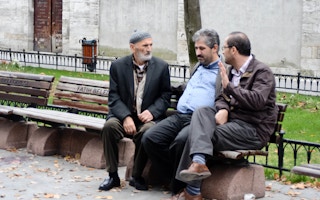I recently woke up at my family’s cabin, hung-over, and got into a car with some friends to embark on our journey home. Somehow, I got talking about climate change.
Although I didn’t expect a complete consensus from my friends, I hoped that they would at least acknowledge what I had said. Instead, I was met with not-so-subtle hints to shut my trap, and complaints that it was ‘too early in the morning to have this type of conversation’.
I wish I could say that this was an isolated incident. I wish I could say that usually, when I bring up this issue, people are keen to learn and talk about it. However, that is not the case.
Although I can understand that my friends may not want to engage in this conversation first thing in the morning, it seems like there is never a time and place that people want to talk about climate change.
Believe me, I don’t always want to talk about it either. Acknowledging the realness and the urgency of this issue is terrifying. Understanding the fact that us Westerners are primarily responsible for it is equally unpleasant.
I’m the first to admit, that I often find thinking and talking about climate change to be overwhelming. It can be extremely depressing, and can leave one feeling helpless within this enormous global issue.
I mean it when I say that I wish that I didn’t have to talk about climate change so much. So then, why do I?
I talk about it because I am genuinely petrified of the future that awaits my generation. I talk about it because I sense that most people around me have not internalised how serious and how immediate this issue really is.
Scientists have been talking about climate change for decades, yet the narrative has hardly changed. The only real difference in these conversations is their increasing urgency, and the fact that they no longer address an issue of the future, they address an issue of now.
However, it’s clear that this approach of trying to ‘raise awareness’ is not sufficiently working. The climate is changing exponentially, but human behaviour is not.
It makes sense that people don’t respond very well to this information. It does not feel good to know that our consumptive lifestyles are the reason that hundreds of people died due to extreme weather events last year, or that 150 million people will likely soon become climate refugees. I get that.
Relevant here is a psychological phenomenon known as ‘cognitive dissonance’. When our beliefs and behaviours don’t line up, it gives us mental stress. To cope, we usually change our beliefs, or change our behaviours, to restore mental consistency.
For example, someone might believe that climate change is a colossal existential issue, but still get into a car and drive every day. To live with themselves, they must either stop driving fuel-powered cars, or silence their beliefs about the threat of climate change. Unfortunately, the latter is often the easier and more common route people take.
However, we cannot continue to choose silence and inaction. Population growth projections show that by 2050, global food production must roughly double, while emissions from the industry must decrease by 80 per cent. Moreover, over half of the global population is expected to suffer from high water stress by 2030. In order to meet our basic needs of survival, it’s clear that ignoring this issue is simply no longer an option.
I like to think that deep down, most of us already know this. We also know that the longer we suppress and ignore this reality, the worse this reality will become, and the harder the issue will be to solve.
The good thing about cognitive dissonance is that it can also function as a positive feedback loop. For example, many people value fresh air, and the beauty of nature, and might work to protect the environment they care about. The more action they take, the more certain they become of their environmental values and their desire to save the natural world.
“
My hope for 2018 is that the dialogues I have about climate change will cease to be about the monstrosities of this issue, and more about mobilising action plans and collaborative initiatives.
I speak from experience, when I say that this type of self-fueling cycle feels a whole lot better than the never-ending pattern of being bombarded with information about the daunting prospects of climate change, and doing nothing about it.
Within the first month of the New Year, many of us make resolutions to change certain habits, or adopt new perspectives or goals. I urge you to take the time of reflection and self-improvement that New Year’s symbolically grants us, to think and learn about your own beliefs and behaviours, and how they relate to climate change.
Personally, my hope for 2018 is that the dialogues I have about climate change will cease to be about the monstrosities of this issue, and more about mobilising action plans and collaborative initiatives. Until the climate action ‘walk’ outpaces the climate change ‘talk,’ people like me will not shut up about climate change, I can promise you that.
Joelle Moses is a student at McGill University in Montreal, and was a youth delegate to the 2017 UN climate talks in Bonn. This story was published with permission from Thomson Reuters Foundation, the charitable arm of Thomson Reuters, that covers humanitarian news, women’s rights, corruption and climate change. Visit news.trust.org.









